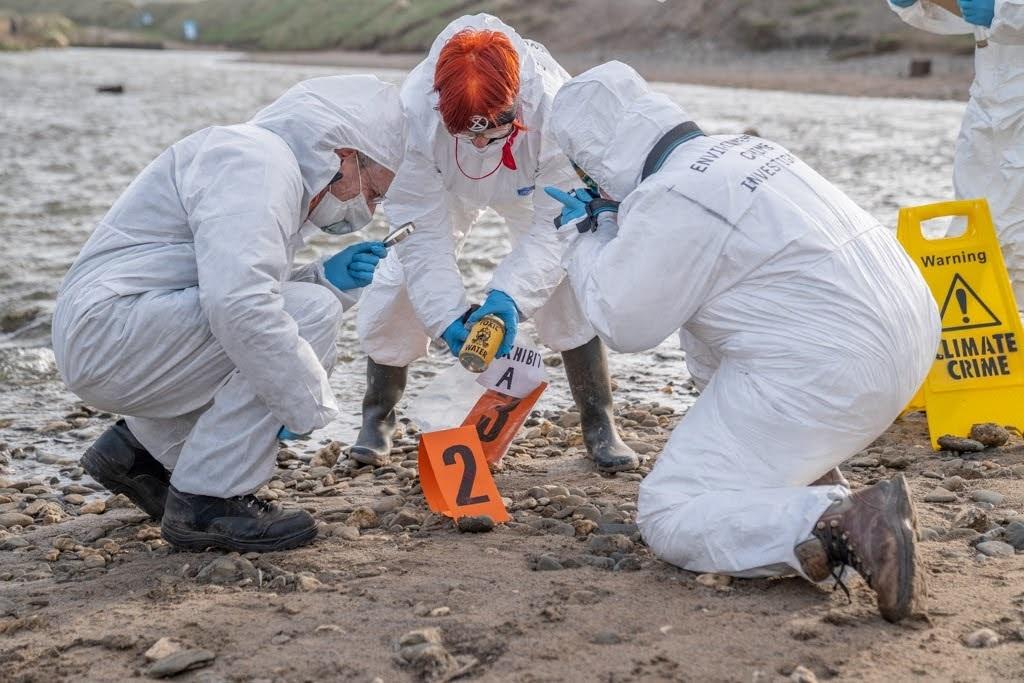THE alleged pollution of Cornwall's rivers and waterways was highlighted by environmental activists Extinction Rebellion (XR) yesterday when they took so-called 'toxic' samples at the mouth of river where it meets the sea.
In the first of a series of actions drawing attention to the issue, XR 'Climate Crime Scene Investigators' collected water samples from the Red River where it meets the sea at Gwithian Beach.
Lesley Fitt, one of the organisers, said: “We are doing this to raise awareness about the illegal levels of toxic chemicals and sewage waste in many of our rivers and the failure of George Eustice MP as Environment Minister to do his job and protect our environment.
"Cuts to the Environment Agency means it is no longer able to control sewage discharge or the release of toxic chemicals into our rivers. This is gross negligence by the government.”
Climate Crime Scene Investigators dressed in white suits cordoned off areas with climate crime scene tape and collected water samples from the Red River into bottles labelled ‘TOXIC’.
The activists say although rivers in Cornwall are not as bad as other parts of England there are still very few that can be regarded as good for wildlife or humans.
In September the Environment Agency reported that only 14% of English rivers are of good ecological standard and none meet legal limits for chemicals.
XR say the figures reveal a "complete lack of progress" towards the target of 100% healthy waters by 2027.
They went on to claim that water companies were "failing to meet environmental performance standards", with four out of the nine water companies nationally rated as poor or requiring improvement.
The group said: "Pollution from sewage discharge, chemicals and agriculture is having a huge impact on river quality, with incidents in 2019 rising to their worst level for five years."
At the time of the report Environment Secretary George Eustice, MP for Camborne and Redruth said: "Water companies have a responsibility to act as custodians of the environment and this report for 2019 shows that some are failing to take their obligations seriously. That is not good enough.
"We have the rightly ambitious target in our 25 Year Environment Plan to bring at least three quarters of our waters as close as possible to their natural state as soon as possible and are bringing forward a legally binding target on water quality in the Environment Bill.
"Our new Environmental Land Management scheme – replacing the EU CAP scheme – will also play a critical part in reducing some of the farming practices which pollute our waters.
"Certain water companies must step up and do better, which is why I will be meeting those who are falling short of our expectations to discuss how we can work together to drive better performance."
But Extinction Rebellion claims it is a failure of government rather than the water companies and farmers for its:
• 'Failure to fund the Environment Agency'
• 'Failure to hold the water companies to account for their lack of infrastructure investment'
• 'Failure to mandate tough rules on the use of sewage sludge in agriculture'
• 'Failure to uphold environmental standards for industry'
• 'Failure to protect us and the natural world from harmful chemicals'
"Government failure on water pollution is harming our health and destroying natural ecosystems at an alarming rate and it's only going to get worse," said Extinction Rebellion, which went on to add that unchecked climate change woukd lead to more extreme rainfall and flooding, causing increased frequency of sewage spills and greater agricultural, industrial and urban runoff into our waterways.
"Government must act now to mitigate climate change and actively conserve our waterways by adopting the Climate and Ecological Emergency Bill.
"The Climate and Ecological Emergency Bill, is our best chance to ensure that the UK plays its fair and proper role in limiting global temperatures to 1.5°C and to ensure that we actively conserve the natural world.
"The bill calls on the UK government to restore the variety, abundance and health of the UK’s biodiversity and ecosystems and requires robust and benchmarked standards to calculate ecosystem health," said the group




Recent comments
1 week 2 days ago
36 weeks 6 days ago
38 weeks 4 days ago
38 weeks 4 days ago
48 weeks 2 days ago
1 year 8 weeks ago
1 year 33 weeks ago
1 year 43 weeks ago
2 years 3 weeks ago
3 years 28 weeks ago